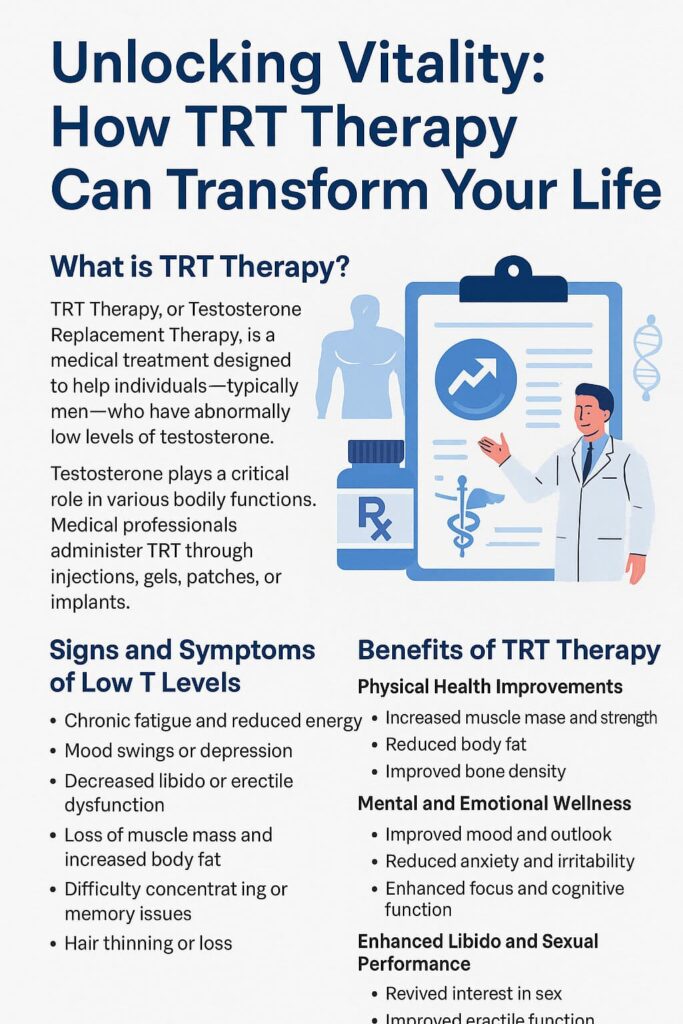What is TRT Therapy?
TRT Therapy, or Testosterone Replacement Therapy, is a medical treatment designed to help individuals—typically men—who have abnormally low levels of testosterone. This therapy involves supplementing the body’s natural hormone levels to restore balance and alleviate symptoms caused by testosterone deficiency.
Testosterone plays a critical role in many bodily functions, including muscle development, bone density, mood regulation, and sexual function. When levels dip below normal, it can lead to a condition called hypogonadism.
Medical professionals administer TRT through various methods, including injections, gels, patches, or implants. Each method offers its own benefits and suitability depending on the individual’s lifestyle and health needs.

Who Needs TRT Therapy? Understanding Low Testosterone
Low testosterone can occur for various reasons, including aging, certain health conditions, or injuries affecting hormone-producing glands. Men over 30 may naturally experience a gradual decline in testosterone levels, but when this drop significantly affects their quality of life, TRT might be necessary.
Common causes of low testosterone include:
- Chronic medical conditions (e.g., diabetes, obesity)
- Certain medications
- Injury or infection of the testicles
- Hormonal disorders
- Genetic conditions
A simple blood test can determine testosterone levels and help a healthcare provider decide if TRT is appropriate.
Signs and Symptoms of Low T Levels
If you’re wondering whether low testosterone could be affecting you, here are the key signs:
- Chronic fatigue and reduced energy
- Mood swings, irritability, or depression
- Decreased libido or erectile dysfunction
- Loss of muscle mass and increased body fat
- Difficulty concentrating or memory issues
- Hair thinning or loss
- Sleep disturbances
These symptoms often develop slowly and can mimic other conditions, making proper diagnosis crucial.
Benefits of TRT Therapy
When properly administered and monitored, TRT Therapy can offer life-changing benefits.
Physical Health Improvements
Patients typically report:
- Increased muscle mass and strength
- Reduced body fat
- Improved bone density and joint strength
- Boosted stamina and physical performance
Mental and Emotional Wellness
Low testosterone is linked to mood disorders. TRT often results in:
- Improved mood and outlook
- Reduced anxiety and irritability
- Enhanced focus and cognitive function
Enhanced Libido and Sexual Performance
Perhaps one of the most noticeable benefits:
- Revived interest in sex
- Improved erectile function
- Better sexual satisfaction
How TRT Therapy Works
The Science Behind Testosterone Replacement
TRT Therapy works by restoring testosterone to healthy levels. This helps reestablish hormonal balance and reverses many symptoms associated with low T.
The therapy must be customized to each patient’s needs to prevent over- or under-treatment.
Types of TRT Delivery Methods
- Injections (IM or Subcutaneous): Most common and cost-effective
- Gels and Creams: Easy application but may transfer to others
- Patches: Consistent delivery, changed daily
- Pellets: Implanted under the skin for slow release over months
- Oral Medications: Newer and more convenient, but less widely used
What to Expect During TRT Treatment
Diagnosis and Blood Testing
Before starting TRT, doctors will conduct:
- Blood tests (morning samples are most accurate)
- Hormone panels
- A thorough physical examination
Personalized Treatment Plans
TRT isn’t a one-size-fits-all approach. Your provider will consider:
- Symptoms
- Lab results
- Health history
Monitoring Progress and Adjustments
After beginning treatment, follow-ups will include:
- Regular blood tests
- Monitoring side effects
- Adjusting dosage as needed
Potential Risks and Side Effects of TRT Therapy
While generally safe under medical supervision, TRT therapy may involve:
- Acne or oily skin
- Increased red blood cell count
- Mild fluid retention
- Decreased sperm production and fertility
- Prostate issues (in some men)
That’s why expert guidance, like from Neumed.com, is essential.
TRT Therapy vs. Natural Boosting Methods
Natural methods such as diet, exercise, and sleep optimization can help mildly low testosterone levels but are usually not enough for men with clinically low T. TRT delivers faster, more effective results and is ideal for men with diagnosed hypogonadism.
Choosing the Right TRT Clinic: Why NeuMed?
Expertise and Personalized Care
Neumed.com provides:
- Board-certified clinicians
- Evidence-based therapies
- Customized treatment plans tailored to your health
Innovative Diagnostic Tools
From advanced hormone panels to modern tracking technology, Neumed.com ensures accuracy and safety every step of the way.
Lifestyle Changes to Support TRT Therapy
Supporting TRT with a healthy lifestyle improves outcomes. Consider:
- A protein-rich, balanced diet
- Resistance training and regular exercise
- Quality sleep
- Stress management techniques
- Avoiding alcohol and smoking
Common Myths and Misconceptions About TRT
- Myth: TRT is only for older men.
- Fact: Younger men with low T can also benefit.
- Myth: TRT causes cancer.
- Fact: No conclusive evidence supports this; doctors monitor prostate health regularly.
- Myth: You’ll see instant results.
- Fact: Full benefits usually develop over weeks or months.
FAQs About TRT Therapy
1. Is TRT Therapy safe?
Yes, when prescribed and monitored by a medical professional, TRT is generally safe.
2. How long before I see results from TRT?
Improvements can begin within weeks, with full benefits noticeable in 3–6 months.
3. Can I stop TRT once I feel better?
TRT is usually a long-term commitment. Stopping may lead to a return of symptoms.
4. Will TRT affect my fertility?
Yes, TRT can reduce sperm production. Discuss fertility goals with your doctor.
5. Is TRT covered by insurance?
Some insurance plans cover TRT. Check with your provider or clinic.
6. Can women undergo TRT?
Yes, in low doses, TRT can benefit women with hormonal imbalances. Always consult a specialist.
Conclusion: Is TRT Therapy Right for You?
TRT Therapy offers a powerful solution for those battling the effects of low testosterone. Whether you’re experiencing fatigue, mood issues, or sexual health concerns, restoring hormonal balance can unlock a more energetic, vibrant you.
At Neumed.com, expert clinicians ensure your therapy is tailored, effective, and safe.









